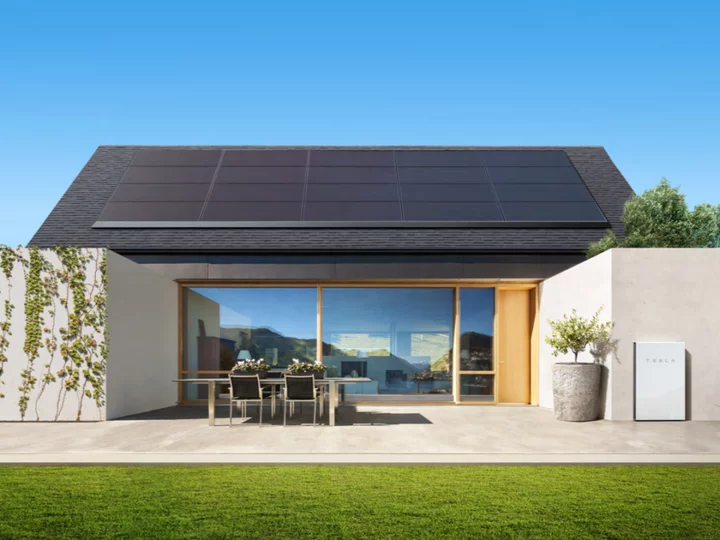
Why did Kim Zolciak and Kroy Biermann call off divorce? 'RHOA' stars decide to give marriage another try
Kim Zolciak and Kroy Bierman are reportedly 'getting along' well at the moment, and want to figure out how to make things work
2023-07-08 19:59

Why would Man Utd want Andre Onana?
Why Manchester United are looking to complete a deal for Inter goalkeeper Andre Onana - a modern day stopper who has tremendous ability with the ball at his feet.
2023-07-08 19:28

Premier League confirm schedule changes for opening 2023/24 fixtures
The Premier League confirm a number of changes to the early weeks of the 2023/24 fixture schedule.
2023-07-08 18:27

How tech could turn our homes into renewable energy power stations
In 1866, Napoleon III was presented with a solar-powered device that its inventor claimed could provide inexhaustible energy. The Emperor of France was so impressed by Augustin Mouchot’s Solar Concentrator that he granted the maths teacher funding to continue its development. The success of Mouchot’s invention – which was the size of a small house – meant solar energy started to be taken seriously as a potential alternative to coal, and scientists got to work on improving and adapting the technology for residential applications. Within a few decades, thousands of homes across the US were fitted with solar water heating systems that could heat homes, warm food and wash clothes, however the oil boom in the 20th century saw the popularity of clean energy collapse. It took until the 1973 oil crisis and soaring prices for solar to regain mainstream attention, and 50 years of technological advances later we may now be on the cusp of realising the revolutionary potential seen by the early pioneers of renewable energy. Recent breakthroughs have made solar panels both cheaper and more efficient, while researchers claim to now be close to creating commercially viable alternatives that could transform homes into fully self-sufficient power stations. These new technologies are finally making it possible to move away from traditional energy reliance, transforming the concept of living off-grid from an alternative lifestyle choice to a realistic solution for a sustainable future. So what are these new technologies, and what might a solar-powered home look like in the next few years? Photovoltaic windows The off-grid solar market is predicted to be worth $394 million by 2030, but this may be a low estimate if solar-powered windows finally break into the commercial market. Last year, a team from École Polytechnique Fédérale de Lausanne in Switzerland achieved a new efficiency record for dye-sensitised solar cells (DSCs), opening up new commercial possibilities for see-through solar panels. The transparent properties of DSCs make them suitable for use in windows, greenhouses and glass facades, offering a theoretical price/performance ratio that is capable of competing with fossil fuel electrical generation. Photovoltaic windows have already been installed in the SwissTech Convention Center, but the latest efficiency record could precede a much wider spread roll out. Solar-powered paint The Sun beams enough energy to Earth in just one hour to power the whole planet for an entire year, yet less than 10 per cent of the global electricity supply comes from solar energy. One of its limitations is that solar panels require roofs or available land – but what if it was possible to transform entire buildings into electricity generators? Scientists claim that solar paint could achieve this at a relatively low cost in the near future. The technology involves photovoltaic quantum dots that capture light and turn it into electric current. Theoretically, these dots could be 11 per cent more efficient than traditional solar panels. A longer-term prospect is spray-on solar cells that use a liquid form of the so-called miracle material perovskite, which researchers at the University of Sheffield say could be used in “practical mass applications” in the coming years. Combined with solar windows, the technology could mean that every single surface of a building that is touched by the Sun could generate power. Solar trees and battery breakthroughs There are more than a million acres of private gardens in the UK, according to the Office for National Statistics, though the space taken up by solar panels currently make them an unpopular option for most homeowners. UK startup SolarBotanic Trees is aiming to change this with a bio-inspired design that features a shaded canopy with integrated seating, heating and outlets. Speaking to The Independent earlier this month, SolarBotanic Trees chief executive Chris Shelley said the first installations are already planned in Oxford next year. “The idea is to put solar panels on a domed surface like the canopy of a tree, and then place a battery storage system in the trunk,” he said. “The trees could go in people’s gardens to supplement rooftop solar panel setups, or several of them could even meet the annual electrical requirement of a medium-sized house.” The solar trees address the need for battery systems that can continue to supply power when the Sun is not shining. Several companies already offer battery packs for homes, most notably Tesla’s Powerwall that has been installed in more than half a million homes around the world. At Tesla’s Investor Day event earlier this year, the company projected that it will take $10 trillion to achieve a “sustainable energy civilisation”, but will require less than 0.2 per cent of the Earth’s surface to achieve. Renewables expert Dr Brian Azzopardi believes the “remarkable pace” of battery and solar advances over the last few years means individuals can already reduce their dependence on energy grids and look towards a more sustainable way of living. “It has revolutionised the renewable energy sector and opened up unprecedented opportunities for individuals to become increasingly self-sufficient with their energy needs,” Dr Azzopardi, who chairs the Foundation for Innovation and Research at the Malta College of Arts, Science and Technology, tells The Independent. “As battery technologies continue to evolve, becoming more affordable and efficient, the possibility of achieving a self-sufficient lifestyle ‘off-the-grid’ becomes increasingly feasible for a wider range of people.” How long until we see off-grid solar homes on a significant scale? In the same way that some developing countries and communities skipped landlines and went straight to mobile phones, it may be communities with no access to a power grid that benefit most from the emerging technology. One startup targeting under-served markets is Zola Electric, which offers “electrical infrastructure in a box” for places without power. It involves a solar panel and battery setup capable of powering a home, with company CEO Bill Lenihan describing it as a “game-changer” for the roughly 3 billion people living without affordable or reliable energy. “Our solutions are installed in homes, businesses, schools and hospitals in 10 countries across four continents, serving over two million customers,” he told The Independent. “They deliver distributed, clean, digital energy solutions for those that need it most.” For developed countries, achieving self-sufficient living with clean energy first requires electrifying all energy – from gas stoves to fuel-powered cars. Mark Jacobson, a professor of civil and environmental engineering at Stanford University, says that recent technological advances and incentivised roll-outs mean it already makes economic sense to transform homes into renewable power stations. “Costs have declined so much in recent years, and tax credits are so abundant, that most homeowners can readily install home solar and battery systems,” Professor Jacobson, who detailed how he made the transition in his 2023 bookNo Miracles Needed: How Today’s Technology Can Save Our Climate and Clean Our Air, told The Independent. “I don’t pay any energy bills, generate 120 per cent of the electricity I consume – selling the rest back to my utility – and have paid back the entire solar plus battery system in six years. My energy is free for the next 25 years.” Read More Electric car drives for 100 hours non-stop on futuristic road Massive mineral deposit discovery could meet global battery and solar panel demand ‘for next 100 years’ Geothermal power: Clean energy beneath our feet that could help UK ditch fossil fuels ‘It’s like having your legs broken’: What it’s like to fly as a disabled traveller In the battle of authors vs robots, the entire craft of writing is at stake
2023-07-08 15:29

'RHONY' stars Sonja Morgan and Luann Lesseps slammed for mispronouncing their Bravo show's name: 'It's CROPPIE!'
A fan said, 'I can't wait. But please stop saying crappy. It's pronounced crawpea lol'
2023-07-08 14:53

Jake Paul vs Nate Diaz: Date, time, streaming options and other details revealed
‘The Problem Child’ will fight the former winner of The Ultimate Fighter 5
2023-07-08 13:29

‘RHOBH’ star Kyle Richards slammed for denying divorce from Mauricio Umansky amid Morgan Wade romance rumors: ‘So staged’
Kyle Richards claimed that she and Morgan Wade are very good friends but she is not divorced from Mauricio Umansky
2023-07-08 12:27

Evan Gershkovich: US confirms Russia contact over prisoner swap for reporter
The White House says it is prepared to do "hard things" to free the American journalist from Russia.
2023-07-08 11:53

'Vanderpump Rules' star Tom Sandoval spotted filming for Season 11 amid fallout with cast, fans say 'narcissist on the loose again'
Tom Sandoval was seen delivering flowers to Lisa Vanderpump at her now-closed restaurant Pump
2023-07-08 11:17

Are Kim Zolciak and Troy Biermann back together? Power couple puts aside differences to attend church with children
Kim Zolciak and Kroy Biermann have decided to give their marriage another try
2023-07-08 09:57

Kris Jenner trolled for promoting daughter Kendall's 818 tequila on cruise ship: 'She’s going to find the submarine'
Watching 'The Kardashians' has become 'a chor' for most fans due to the quantity of screen time the sisters' numerous enterprises receive
2023-07-08 09:48

Cluster bombs: Biden defends decision to send Ukraine controversial weapons
The weapons have a record of killing civilians - and the president said sending them was a difficult decision.
2023-07-08 09:20
